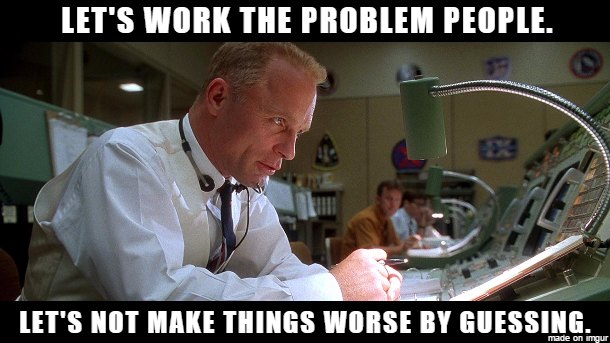Talking to Technical People
(Don’t) drop the hint: communicating with technical people
This post is a subset of the presentation “Escaping the data center — tales from a recovering manager”. Video, slides.
When we communicate at the office, we frequently do not directly say what we mean. A common conversation might go like this “Hey John, we did a survey and it turns out people can’t find what they are looking for on our website”. And then John might say “Seriously — well, we should be looking into that quickly then. Can you get me that survey?”
What happened here is that John got a polite version of “John, this survey says our website sucks, go fix it”. Except that everyone can feel a lot better about it — the polite version goes down way smoother & leaves feathers unruffled. And because John is very used to communicating like this, he harbours no doubt that he just got work assigned to him.
Many years ago I lamented to my office manager that our cleaners did not listen to me. So she asked, what did you tell them? I explained I had “indicated” that the corridor on the third floor had seen cleaner days. Being wise in the way of running things (like supermarkets), Marieka immediately diagnosed the problem — I had been telling a story, dropping hints, and not telling people what my problem was. And this leads to the risk of folks misunderstanding what you mean — because you did not say what you meant.
Now, as engineers, technical people or specialists in general, we hate to be told what to do exactly. We love it when you let us know what you want to achieve and when you need it, so we can get on with it and make it happen. If you also tell us why you need it, we might opine you actually don’t and there is a better way of doing it.
Just don’t tell us exactly how, because that is our job. In other words, tell us the desired outcome, relevant constraints, timeline, motivation and we’ll do our best.
Or at least that is how we like to feel about how we work. In fact we might disagree a lot with the what, the why and the when, and we can be super stubborn and difficult. But the idea remains — let us do our job, and we’ll deliver better results than when you micromanage us. More on this in the presentation linked at the start (Video, slides).
On the flip side of the coin however.. many/most of us aren’t well equipped to pick up hints, interpret your stories as orders, or read between the lines to figure out your real meaning. Sorry. Something had to give when we learned 15000 pages of expert and arcane knowledge, and this was it.
And we might not even apologise — communicating indirectly about technical matters is asking for trouble. If you indicate vaguely what you want, you are likely to exactly not get it.
So on behalf of subject matter experts that are frankly somewhat wonky & geeky: please know we require slightly different handling than your other colleagues. Talking to us in hints and stories may be polite, but we might not pick up that you are sending us a serious message or asking us to do specific things. Do not put your important message between the lines.
When in doubt: be explicit. It will almost never hurt. Just leave us some room on the “how”.
Thanks!

